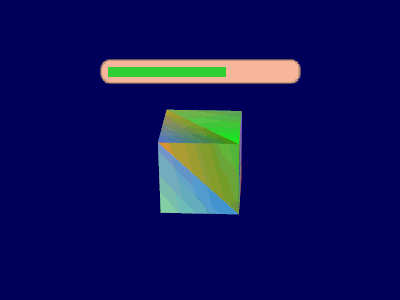在3D世界中渲染2D精灵?
如果我有一个精灵的png,我如何在OpenGL中渲染2D精灵?看图像作为我想要实现的效果的一个例子。另外我想在屏幕上覆盖武器,就像底部图像中的步枪一样。有谁知道我将如何实现这两种效果?任何帮助是极大的赞赏。


7 个答案:
答案 0 :(得分:8)
在3D术语中,这称为“广告牌”。广告牌是完全平坦的2D平面,上面有纹理,它总是面向相机。
请参阅此处获取纯粹的OpenGL实现:http://nehe.gamedev.net/data/articles/article.asp?article=19
几乎任何3D引擎都应该能够默认执行它们。例如,Ogre3D可以做到这一点。
答案 1 :(得分:2)
a)对于第一种情况:
那不是2D精灵。这些人似乎被渲染为单个四边形,其纹理具有某种透明度(alpha测试或alpha混合)。
无论如何,即使单个四边形仍然可以被视为3D对象,因此对于这种情况,您可能希望将其视为一个:跟踪其平移和旋转并以与任何其他3D对象相同的方式呈现它。
b)对于第二种情况:
如果您想要在没有任何透视变换的情况下将枪(2D图片,我按下)渲染到同一个地方,那么您可以使用与绘制GUI(等)相同的技术。看看我的帖子:
答案 2 :(得分:1)
对于2D武器的叠加,您可以使用glOrtho作为摄像机视图。
答案 3 :(得分:1)
您可以创建一个3d四元组并将基于.png的纹理映射到它。您可以将四边形面向任何您想要的方向,如第一张图片,或使其始终面向相机(如Svenstaro所提到的广告牌),如第二张图片中所示。虽然,公平地说,我确信第二张图片只是在软件创建的帧缓冲区(看起来像Wolf3d技术,软件渲染)中直接显示图像(带有一些缩放)。
答案 4 :(得分:1)
看看OpenGL Point Sprites:
http://www.informit.com/articles/article.aspx?p=770639&seqNum=7
对于部分系统特别有用,但可以为您的目的提供技巧。
答案 5 :(得分:1)
查看本教程有关广告牌的信息。我觉得你会觉得很有用。 http://www.lighthouse3d.com/opengl/billboarding/
答案 6 :(得分:0)
opengl-tutorial 有:
- 专注于能量栏的教程http://www.opengl-tutorial.org/intermediate-tutorials/billboards-particles/billboards/
- 正常运行的OpenGL 3.3 + WTF licensed代码:https://github.com/opengl-tutorials/ogl/blob/71cad106cefef671907ba7791b28b19fa2cc034d/tutorial18_billboards_and_particles/tutorial18_billboards.cpp
截图:
代码:
#include <stdio.h>
#include <stdlib.h>
#include <vector>
#include <algorithm>
#include <GL/glew.h>
#include <glfw3.h>
GLFWwindow* window;
#include <glm/glm.hpp>
#include <glm/gtc/matrix_transform.hpp>
#include <glm/gtx/norm.hpp>
using namespace glm;
#include <common/shader.hpp>
#include <common/texture.hpp>
#include <common/controls.hpp>
#define DRAW_CUBE // Comment or uncomment this to simplify the code
int main( void )
{
// Initialise GLFW
if( !glfwInit() )
{
fprintf( stderr, "Failed to initialize GLFW\n" );
getchar();
return -1;
}
glfwWindowHint(GLFW_SAMPLES, 4);
glfwWindowHint(GLFW_RESIZABLE,GL_FALSE);
glfwWindowHint(GLFW_CONTEXT_VERSION_MAJOR, 3);
glfwWindowHint(GLFW_CONTEXT_VERSION_MINOR, 3);
glfwWindowHint(GLFW_OPENGL_FORWARD_COMPAT, GL_TRUE); // To make MacOS happy; should not be needed
glfwWindowHint(GLFW_OPENGL_PROFILE, GLFW_OPENGL_CORE_PROFILE);
// Open a window and create its OpenGL context
window = glfwCreateWindow( 1024, 768, "Tutorial 18 - Billboards", NULL, NULL);
if( window == NULL ){
fprintf( stderr, "Failed to open GLFW window. If you have an Intel GPU, they are not 3.3 compatible. Try the 2.1 version of the tutorials.\n" );
getchar();
glfwTerminate();
return -1;
}
glfwMakeContextCurrent(window);
// Initialize GLEW
glewExperimental = true; // Needed for core profile
if (glewInit() != GLEW_OK) {
fprintf(stderr, "Failed to initialize GLEW\n");
getchar();
glfwTerminate();
return -1;
}
// Ensure we can capture the escape key being pressed below
glfwSetInputMode(window, GLFW_STICKY_KEYS, GL_TRUE);
// Hide the mouse and enable unlimited mouvement
glfwSetInputMode(window, GLFW_CURSOR, GLFW_CURSOR_DISABLED);
// Set the mouse at the center of the screen
glfwPollEvents();
glfwSetCursorPos(window, 1024/2, 768/2);
// Dark blue background
glClearColor(0.0f, 0.0f, 0.4f, 0.0f);
// Enable depth test
glEnable(GL_DEPTH_TEST);
// Accept fragment if it closer to the camera than the former one
glDepthFunc(GL_LESS);
GLuint VertexArrayID;
glGenVertexArrays(1, &VertexArrayID);
glBindVertexArray(VertexArrayID);
// Create and compile our GLSL program from the shaders
GLuint programID = LoadShaders( "Billboard.vertexshader", "Billboard.fragmentshader" );
// Vertex shader
GLuint CameraRight_worldspace_ID = glGetUniformLocation(programID, "CameraRight_worldspace");
GLuint CameraUp_worldspace_ID = glGetUniformLocation(programID, "CameraUp_worldspace");
GLuint ViewProjMatrixID = glGetUniformLocation(programID, "VP");
GLuint BillboardPosID = glGetUniformLocation(programID, "BillboardPos");
GLuint BillboardSizeID = glGetUniformLocation(programID, "BillboardSize");
GLuint LifeLevelID = glGetUniformLocation(programID, "LifeLevel");
GLuint TextureID = glGetUniformLocation(programID, "myTextureSampler");
GLuint Texture = loadDDS("ExampleBillboard.DDS");
// The VBO containing the 4 vertices of the particles.
static const GLfloat g_vertex_buffer_data[] = {
-0.5f, -0.5f, 0.0f,
0.5f, -0.5f, 0.0f,
-0.5f, 0.5f, 0.0f,
0.5f, 0.5f, 0.0f,
};
GLuint billboard_vertex_buffer;
glGenBuffers(1, &billboard_vertex_buffer);
glBindBuffer(GL_ARRAY_BUFFER, billboard_vertex_buffer);
glBufferData(GL_ARRAY_BUFFER, sizeof(g_vertex_buffer_data), g_vertex_buffer_data, GL_DYNAMIC_DRAW);
#ifdef DRAW_CUBE
// Everything here comes from Tutorial 4
GLuint cubeProgramID = LoadShaders( "../tutorial04_colored_cube/TransformVertexShader.vertexshader", "../tutorial04_colored_cube/ColorFragmentShader.fragmentshader" );
GLuint cubeMatrixID = glGetUniformLocation(cubeProgramID, "MVP");
static const GLfloat g_cube_vertex_buffer_data[] = { -1.0f,-1.0f,-1.0f,-1.0f,-1.0f, 1.0f,-1.0f, 1.0f, 1.0f,1.0f, 1.0f,-1.0f,-1.0f,-1.0f,-1.0f,-1.0f, 1.0f,-1.0f,1.0f,-1.0f, 1.0f,-1.0f,-1.0f,-1.0f,1.0f,-1.0f,-1.0f,1.0f, 1.0f,-1.0f,1.0f,-1.0f,-1.0f,-1.0f,-1.0f,-1.0f,-1.0f,-1.0f,-1.0f,-1.0f, 1.0f, 1.0f,-1.0f, 1.0f,-1.0f,1.0f,-1.0f, 1.0f,-1.0f,-1.0f, 1.0f,-1.0f,-1.0f,-1.0f,-1.0f, 1.0f, 1.0f,-1.0f,-1.0f, 1.0f,1.0f,-1.0f, 1.0f,1.0f, 1.0f, 1.0f,1.0f,-1.0f,-1.0f,1.0f, 1.0f,-1.0f,1.0f,-1.0f,-1.0f,1.0f, 1.0f, 1.0f,1.0f,-1.0f, 1.0f,1.0f, 1.0f, 1.0f,1.0f, 1.0f,-1.0f,-1.0f, 1.0f,-1.0f,1.0f, 1.0f, 1.0f,-1.0f, 1.0f,-1.0f,-1.0f, 1.0f, 1.0f,1.0f, 1.0f, 1.0f,-1.0f, 1.0f, 1.0f,1.0f,-1.0f, 1.0f};
static const GLfloat g_cube_color_buffer_data[] = { 0.583f, 0.771f, 0.014f,0.609f, 0.115f, 0.436f,0.327f, 0.483f, 0.844f,0.822f, 0.569f, 0.201f,0.435f, 0.602f, 0.223f,0.310f, 0.747f, 0.185f,0.597f, 0.770f, 0.761f,0.559f, 0.436f, 0.730f,0.359f, 0.583f, 0.152f,0.483f, 0.596f, 0.789f,0.559f, 0.861f, 0.639f,0.195f, 0.548f, 0.859f,0.014f, 0.184f, 0.576f,0.771f, 0.328f, 0.970f,0.406f, 0.615f, 0.116f,0.676f, 0.977f, 0.133f,0.971f, 0.572f, 0.833f,0.140f, 0.616f, 0.489f,0.997f, 0.513f, 0.064f,0.945f, 0.719f, 0.592f,0.543f, 0.021f, 0.978f,0.279f, 0.317f, 0.505f,0.167f, 0.620f, 0.077f,0.347f, 0.857f, 0.137f,0.055f, 0.953f, 0.042f,0.714f, 0.505f, 0.345f,0.783f, 0.290f, 0.734f,0.722f, 0.645f, 0.174f,0.302f, 0.455f, 0.848f,0.225f, 0.587f, 0.040f,0.517f, 0.713f, 0.338f,0.053f, 0.959f, 0.120f,0.393f, 0.621f, 0.362f,0.673f, 0.211f, 0.457f,0.820f, 0.883f, 0.371f,0.982f, 0.099f, 0.879f};
GLuint cubevertexbuffer;
glGenBuffers(1, &cubevertexbuffer);
glBindBuffer(GL_ARRAY_BUFFER, cubevertexbuffer);
glBufferData(GL_ARRAY_BUFFER, sizeof(g_cube_vertex_buffer_data), g_cube_vertex_buffer_data, GL_DYNAMIC_DRAW);
GLuint cubecolorbuffer;
glGenBuffers(1, &cubecolorbuffer);
glBindBuffer(GL_ARRAY_BUFFER, cubecolorbuffer);
glBufferData(GL_ARRAY_BUFFER, sizeof(g_cube_color_buffer_data), g_cube_color_buffer_data, GL_DYNAMIC_DRAW);
#endif
double lastTime = glfwGetTime();
do
{
// Clear the screen
glClear(GL_COLOR_BUFFER_BIT | GL_DEPTH_BUFFER_BIT);
double currentTime = glfwGetTime();
double delta = currentTime - lastTime;
lastTime = currentTime;
computeMatricesFromInputs();
glm::mat4 ProjectionMatrix = getProjectionMatrix();
glm::mat4 ViewMatrix = getViewMatrix();
#ifdef DRAW_CUBE
// Again : this is just Tutorial 4 !
glDisable(GL_BLEND);
glUseProgram(cubeProgramID);
glm::mat4 cubeModelMatrix(1.0f);
cubeModelMatrix = glm::scale(cubeModelMatrix, glm::vec3(0.2f, 0.2f, 0.2f));
glm::mat4 cubeMVP = ProjectionMatrix * ViewMatrix * cubeModelMatrix;
glUniformMatrix4fv(cubeMatrixID, 1, GL_FALSE, &cubeMVP[0][0]);
glEnableVertexAttribArray(0);
glBindBuffer(GL_ARRAY_BUFFER, cubevertexbuffer);
glVertexAttribPointer(0, 3, GL_FLOAT, GL_FALSE, 0, (void*)0 );
glEnableVertexAttribArray(1);
glBindBuffer(GL_ARRAY_BUFFER, cubecolorbuffer);
glVertexAttribPointer(1, 3, GL_FLOAT, GL_FALSE, 0, (void*)0 );
glDrawArrays(GL_TRIANGLES, 0, 12*3);
glDisableVertexAttribArray(0);
glDisableVertexAttribArray(1);
#endif
// We will need the camera's position in order to sort the particles
// w.r.t the camera's distance.
// There should be a getCameraPosition() function in common/controls.cpp,
// but this works too.
glm::vec3 CameraPosition(glm::inverse(ViewMatrix)[3]);
glm::mat4 ViewProjectionMatrix = ProjectionMatrix * ViewMatrix;
glEnable(GL_BLEND);
glBlendFunc(GL_SRC_ALPHA, GL_ONE_MINUS_SRC_ALPHA);
// Use our shader
glUseProgram(programID);
// Bind our texture in Texture Unit 0
glActiveTexture(GL_TEXTURE0);
glBindTexture(GL_TEXTURE_2D, Texture);
// Set our "myTextureSampler" sampler to user Texture Unit 0
glUniform1i(TextureID, 0);
// This is the only interesting part of the tutorial.
// This is equivalent to mlutiplying (1,0,0) and (0,1,0) by inverse(ViewMatrix).
// ViewMatrix is orthogonal (it was made this way),
// so its inverse is also its transpose,
// and transposing a matrix is "free" (inversing is slooow)
glUniform3f(CameraRight_worldspace_ID, ViewMatrix[0][0], ViewMatrix[1][0], ViewMatrix[2][0]);
glUniform3f(CameraUp_worldspace_ID , ViewMatrix[0][1], ViewMatrix[1][1], ViewMatrix[2][1]);
glUniform3f(BillboardPosID, 0.0f, 0.5f, 0.0f); // The billboard will be just above the cube
glUniform2f(BillboardSizeID, 1.0f, 0.125f); // and 1m*12cm, because it matches its 256*32 resolution =)
// Generate some fake life level and send it to glsl
float LifeLevel = sin(currentTime)*0.1f + 0.7f;
glUniform1f(LifeLevelID, LifeLevel);
glUniformMatrix4fv(ViewProjMatrixID, 1, GL_FALSE, &ViewProjectionMatrix[0][0]);
// 1rst attribute buffer : vertices
glEnableVertexAttribArray(0);
glBindBuffer(GL_ARRAY_BUFFER, billboard_vertex_buffer);
glVertexAttribPointer(
0, // attribute. No particular reason for 0, but must match the layout in the shader.
3, // size
GL_FLOAT, // type
GL_FALSE, // normalized?
0, // stride
(void*)0 // array buffer offset
);
// Draw the billboard !
// This draws a triangle_strip which looks like a quad.
glDrawArrays(GL_TRIANGLE_STRIP, 0, 4);
glDisableVertexAttribArray(0);
// Swap buffers
glfwSwapBuffers(window);
glfwPollEvents();
} // Check if the ESC key was pressed or the window was closed
while( glfwGetKey(window, GLFW_KEY_ESCAPE ) != GLFW_PRESS &&
glfwWindowShouldClose(window) == 0 );
// Cleanup VBO and shader
glDeleteBuffers(1, &billboard_vertex_buffer);
glDeleteProgram(programID);
glDeleteTextures(1, &TextureID);
glDeleteVertexArrays(1, &VertexArrayID);
#ifdef DRAW_CUBE
glDeleteProgram(cubeProgramID);
glDeleteVertexArrays(1, &cubevertexbuffer);
glDeleteVertexArrays(1, &cubecolorbuffer);
#endif
// Close OpenGL window and terminate GLFW
glfwTerminate();
return 0;
}
在Ubuntu 15.10上测试。
这个问题的面向轴的版本:https://gamedev.stackexchange.com/questions/35946/how-do-i-implement-camera-axis-aligned-billboards我们在这里做了一个面向观点的广告牌。
- 我写了这段代码,但我无法理解我的错误
- 我无法从一个代码实例的列表中删除 None 值,但我可以在另一个实例中。为什么它适用于一个细分市场而不适用于另一个细分市场?
- 是否有可能使 loadstring 不可能等于打印?卢阿
- java中的random.expovariate()
- Appscript 通过会议在 Google 日历中发送电子邮件和创建活动
- 为什么我的 Onclick 箭头功能在 React 中不起作用?
- 在此代码中是否有使用“this”的替代方法?
- 在 SQL Server 和 PostgreSQL 上查询,我如何从第一个表获得第二个表的可视化
- 每千个数字得到
- 更新了城市边界 KML 文件的来源?
